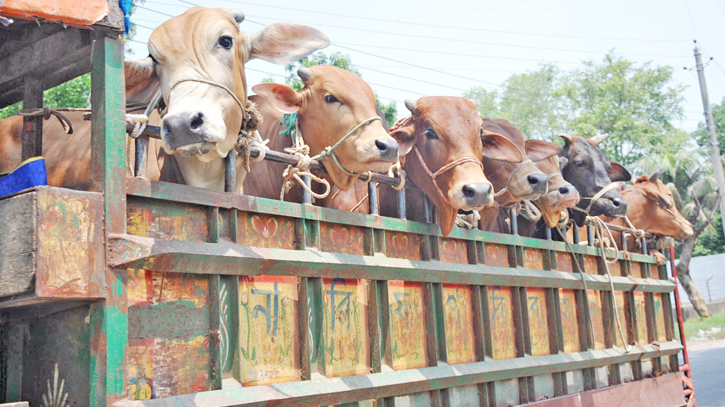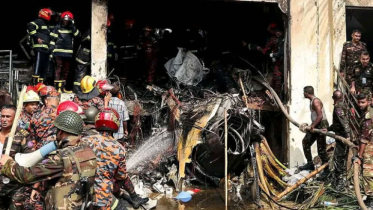
Photo: Collected
Most of the farmers in the country are unable to meet their desired target of fattening cows due to the hot temperature. In many cases, cows are dying due to heat. Besides, farmers are afraid to provide enough feed due to the fear that their cattle will catch diseases in the hot temperature. As a result, they are in trouble due to the disruption in fattening. Besides, the cost of additional medicine, being used to keep animals safe in summer, has increased by about 20 per cent.
Experts say even if bathed once in summer, it is better to spray water on the animals’ bodies repeatedly. In addition, cattle should be fed drinking water below 18 degrees Celsius as normal water is too hot. They also suggest feeding raw grass along with vitamin C and glucose along with water.
In the past, before Eid-ul-Adha, a large number of Indian and Myanmar cows used to be brought to the country illegally through the border. After Awami League came to power for the second term, from 2016, the government took effective measures to stop the practice of illegally bringing cows via the border.
At that time, India's BJP government also imposed restrictions on the border to stop cow smuggling. Since 2017, the arrival of cows almost stopped, causing prices to increase in the country. As a result, interest in cow rearing among the country's farmers began to increase. According to Bangladesh Dairy Farmers Association (BDFA), there are more than nine lakh small and large fattening and dairy farms in the country.
Fisheries and Livestock Minister Md Abdur Rahman said that 1.3 crore animals are ready to be sacrificed during Eid. The festival is only a few days away and farmers are now busy fattening cows. But this time, farmers are in a lot of trouble because the heat is excessive.
Since the beginning of April, heat increased throughout the country. At one stage, it rose to about 43 degrees Celsius. It was the highest sustained temperature in the country's history. Due to heat, animals are not eating enough food. Besides, cows have died in many farms.
Farmers say that even if relatively large cows are provided with sufficient open environment and air system in hot weather, various symptoms, including asthma, are arising. Sometimes, cows stop eating altogether.
The local livestock office says 13 cows died in heat in Manirampur upazila of Jashore in one month and 22 cows died in 45 days in Savar of Dhaka. Cows dying all over the country has been reported in newspapers. There is an organisation called Samaj and Jati Gathan (Sajag) in Dhamrai. It has given more than 5,000 cows to farmers under the microfinance scheme.
Abdul Matin, director of Sajag, told The Daily Messenger that some of the cows of their organisation had died due to excessive heat. “Besides, due to less food intake, farmers could not increase the amount of meat according to the target. In addition, the cost has also increased due to giving additional medicine to cows in the hot temperature.”
Mohammad Imran Hossain, president of Bangladesh Dairy Farmers Association (BDFA), said that he has information about the death of hundreds of cows. “I guess many more cows have died. More than 99 per cent of the animals have lost weight in the continuous heat. Costs of farms to keep cows healthy have increased by at least 20 per cent.”
In this regard, Director (Research) of Bangladesh Livestock Research Institute Nasrin Sultana told The Daily Messenger that many farmers are facing difficulties in fattening cows this summer. She said there is no alternative to extra precautions to keep animals in normal condition, suggesting special training for farmers.
Sher-e-Bangla Agricultural University’s Dean of Animal Science and Veterinary Medicine Faculty and Chairman of the Department of Medicine and Public Health Professor Dr KBM Saiful Islam told The Daily Messenger that continuous heat wave is very dangerous for cows and a temperature of 15-25 degrees is tolerable for them.
“Cows live best at 20 degrees. And the more it increases above 25 degrees, the more heat stress occurs, but a temperature of up to 30 degrees can be tolerated by cows. If it is more than this, it can cause various problems, including increased breathing rate. Above 36 degrees is dangerous. This means that the current temperature in the country is very unsafe for cows. In this case, cows may catch various diseases and the risk of dying from heatstroke increases,” he explained.
Professor Saiful said animal feed should be controlled in severe heat and cows should be fed three times more water than usual. “It is better to give vitamin C with water. If the farm has a tin roof, wet stuff like sacks or blankets will keep it cold. Adequate fans should be kept in the farm for ventilation.”
He further said, “Even if cows are bathed once a day, it is better if water is sprayed in their bodies repeatedly. Now normal water is quite hot. It is better if they are given water below 18 degrees to drink. But it should not be as cold as ice. Then it could backfire. Tube well water can be fed. Giving some medicine along with vitamin C and glucose will give some relief to cows. More raw grass should be fed.”
Messenger/Fameema








